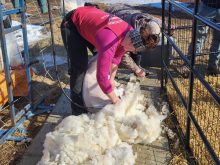PENTICTON, B.C. — Settling First Nations land claims in British Columbia is rife with controversy and uncertainty, especially for sitting tenants who rely on grazing leases or resource extraction to make a living.
“It is an emotional issue for many of you, and many of you are potentially going to be impacted,” said Grant Huffman, chair of the B.C. Cattlemen’s Association’s aboriginal affairs committee.
“We don’t know how that might be.… It is quite easy for those in the west end of Vancouver to be very benevolent and understanding of the issues, but directly they are not affected.”
Read Also

Charges laid after cattle theft
Saskatchewan RCMP lay two charges against a man after six cattle went missing.
Land settlement negotiations have been underway for years, and some are reaching completion. However, cattle producer and resource groups have not been invited to the discussions.
“We will not be at the table, but we will hopefully be listened to at some level,” Huffman told the BCCA’s annual meeting held in Penticton May 26-28.
“To date, that has been well carried out. The current government is aware of our displeasure.”
Members passed a resolution asking for ranchers and other groups that use the land to be represented during negotiations so that their interests and concerns are heard.
“Our government, our constitution and our senior court has all made it very evident to us, that things are going to happen, whether some of you like it or you don’t,” Huffman said.
Ranchers need to prepare for change because some could lose provincial grazing tenures on crown owned land. The government has indicated it may provide a third party liaison to work with those who are affected.
Northern Shuswap treaty negotiations could have a significant impact because there are a large number of grazing tenures in the region.
“The northern Shuswap treaty talks are the beginning and could be a model for how this is going to follow along,” Huffman said.
Negotiators for Canada, B.C. and the Northern Shuswap First Nations reached an agreement in principle last year that outlined how a final treaty would look, but no information has been released.
Provincial negotiators are not prepared at this time to discuss mitigation options or compensation. Huffman estimates 57 tenure holders have land in the area and could be affected.
Bev Madley of the Chilcotin Stockmen’s Association has had first-hand experience with land claims and is not sure how her ranch might come through this.
Six bands in her area are negotiating settlements.
“All of us who have tenures on crown land should be able to make some comment into these negotiations, but they were held strictly in a confidential environment,” she said.
Long-time tenures could be lost or leases may not be extended while the First Nations and government negotiate.
Some bands have said future agreements would continue, while others have said the tenure holders must leave First Nations land.
“The chiefs say one thing but the people they represent say another, so we don’t know what the hell is going on,” Madley said.
Her family wants to pass the ranch to the next generation, but there is little to transfer if the grazing tenures are lost.
Private land is often attached to the leases to form a larger ranching operation. Leaseholders have been allowed to fence the land and develop water sources, and that investment could be lost.
“Private land is not enough to do what we do now. We need crown land to carry on,” she said.
There are 203 bands in B.C., of which 104 are involved at some level in the treaty process. The other 99 bands may never get involved.
However, some accords are more like conciliatory agreements. If these types of agreements succeed, the BCCA hopes they could become a good model for the remaining bands not involved in the treaty process.
Provisions in the Nenqay Deni Accord covering 66,000 sq. kilometres can be seen at www.tsilhqotin.ca/PDFs/Nenqay_Deni_Accord.pdf.


















